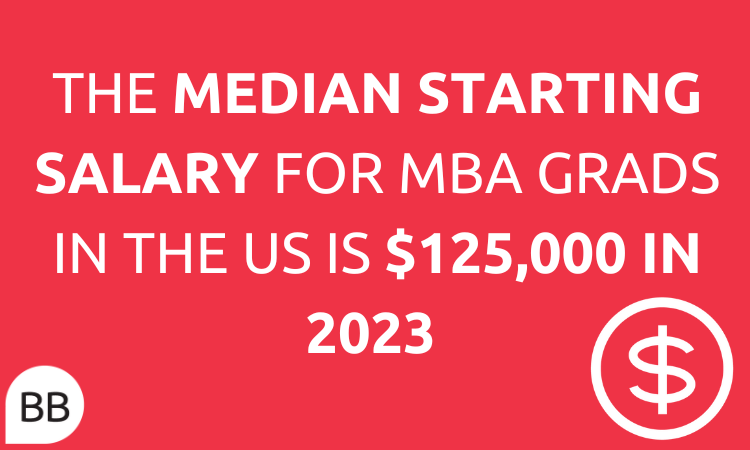The cost of attending business school is undeniably steep, with top MBA programs in the United States costing around $160,500 in tuition fees alone, according to our BusinessBecause Cost of MBA Report 2023 . But when it comes to MBA salaries after graduation, the return on your investment is significant.
Doing a full-time MBA at a top school can land you a six figure salary immediately after graduation—with some graduates landing bonuses upwards of $80,000.
There’s no one answer to the question ‘What salary you will earn after an MBA?’ MBA salaries vary by industry, location, and the business school you graduate from.
While there are many more reasons to pursue an MBA than salary uplift alone, understanding MBA salaries across industries and schools will give you a better idea of what you can expect to gain from your MBA.
Here, we break down some of the latest annual salary data for full-time MBA graduates in the USA:
Read on or skip to your section of interest by clicking the links below:
BB Takeaway: Understanding MBA salaries

Average MBA salary in the USA
If you’re an international student, getting an H-1B visa to stay and work in the US after graduation is tricky. But the good news is that salaries in the US are typically higher than elsewhere.
According to data from the Graduate Management Admission Council (GMAC), while MBA starting salaries saw a downward turn in previous years, salaries increased substantially in 2023. The latest GMAC 2023 report shows that the average median salary for MBA adjusted for inflation is $125,000, compared to $115,000 in 2022.
There is, of course, big variation depending on where in the US you’re studying and plan to work, and what job role and industry you go into.
What is the average salary for an MBA graduate in the USA? USNews.com reports the following statistics for average starting salaries for MBA grads in the class of 2023:
US average across all schools in 2023: $128k
Average of the 10 US business schools whose MBAs net the highest salaries: $210k
Average of the 10 US business schools whose MBAs net the lowest salaries: $62k
Due to recovery from the Covid pandemic and increased salary projections across finance, insurance and real estate, class of 2023 graduates have fared better than previous years. The National Association of Colleges and Employers conducted a survey indicating that the average predicted compensation for the MBA class of 2023 is $91k.
MBA salary by industry
While many MBA graduates still work in consulting and finance, you can find MBAs working in any industry in today’s jobs market.
From technology to real estate and healthcare, salaries can vary significantly by industry. There’s a big difference between how much you can earn working in finance versus nonprofit, for example.
Here, we break down salaries in some of the most popular post-MBA industries, by looking at MBA specializations on salaries website Payscale. How much do MBA students specializing in tech, consulting, finance, or marketing earn in their respective fields after graduation in 2024?
Average salary for MBA in technology: $111k
As the business landscape becomes increasingly data-driven, graduates from MBA programs specializing in technology can earn average salaries of $111k. Chief Information Officers (CIOs) can earn a massive $175k, while product managers earn an average of $106k and senior data analysts earn $90k.
Average salary for MBA in consulting: $100k
MBA talent remains fiercely sought-after by consulting firms, offering high compensation despite a pause in salary growth in 2024. MBA hires at the big three consulting firms (McKinsey, Bain, and BCG) earn a base salary of $190k! Across the industry, the average salary for MBAs who land management consultant roles is $96k.
Average salary for MBA in finance: $106k
The average salary for a finance MBA grad working in the finance sector sits at $106k, a major upgrade on the average salary of $79k for someone with a bachelor’s degree in the same sector. Pursuing higher qualifications might take you from $67k as a Financial Analyst to $148k as a CFO.
Average salary for MBA in marketing: $99k
Salaries for MBAs in marketing cover a wide field, from $56k for a Marketing Specialist to almost three times that, $153k, for a VP. A range of positions crack $100k a year, including Senior Marketing Manager ($107k) and Senior Product Manager ($133k).
MBA salary by school
While MBA tuition fees can vary vastly between institutions, at most top schools you get what you pay for. Employers know this too and are willing to pay a premium for graduates who’ve proved their mettle in the most demanding, and most rewarding, MBA programs.
Here are the three US schools whose graduates consistently bag the highest salaries. The figures below are for average MBA salaries three years after graduation and are taken from our list of 20 Business Schools Where Graduates Earn The Most. The average salaries are the latest figures from the Financial Times Global MBA ranking 2024.
Average salary for Harvard MBA graduates: $246k

Graduates from Harvard's MBA can expect to earn $246k ©HBS Facebook
According to Harvard’s latest recruiting data 57% of graduates in the class of 2023 scored a signing bonus, averaging $30,000. Another 70% received a performance bonus worth an average $40,000.
Average salary for Stanford MBA graduates: $250k

Graduates from Stanford's MBA can expect to earn $250k ©Stanford GSB Facebook
Stanford has an established track record as the business school whose MBA graduates snag the highest average salaries. According to Stanford’s latest MBA careers report, 49% received signing bonuses averaging $42,249, and 68% expected performance bonuses of $99,347 straight after graduation.
Average salary for Wharton MBA graduates: $245k

Graduates from Wharton's MBA can expect to earn $245k ©Wharton Facebook
75% of Wharton’s class of 2023 sought out new jobs after graduation and 37.3% wound up in financial services. For the 28.8% who entered consulting, the average salary hit $190,000 before any other perks or bonuses. Only 2% entered the legal and professional services sector, which earned them a whopping $215,000 base.
Understanding MBA salaries
Ultimately, the actual compensation you secure will depend on variables such as your location, seniority, industry and work experience.
Schools outside the US can also be attractive options, offering a broader educational and networking experience that will also secure a generous salary. Take, for example:
INSEAD, where MBAs earn $198k three years after graduation. According to salary website emolument, the highest-paid INSEAD alumni are insurance professionals at $188k annually; R&D, pharmaceuticals and biotech professionals at $154,000, and those employed in the public and not-for-profit sectors at $144k.
Or, Indian Institute of Management (IIM) Ahmedabad and Bangalore where MBAs earn average salaries of over $194k and over $167k respectively, three years after graduation. Not only do IIM MBAs earn well, the Institute has recorded a 99-100% employment rate for its MBA students in the three months following graduation.
Wherever you go to business school, bear in mind that an MBA is an investment that pays off over your whole career—remember that these projections apply to your first job after graduating, and it should be onward and upward from there.
The pursuit of an MBA is part of a broader journey towards bigger and better things.
This article was updated in May 2024.


